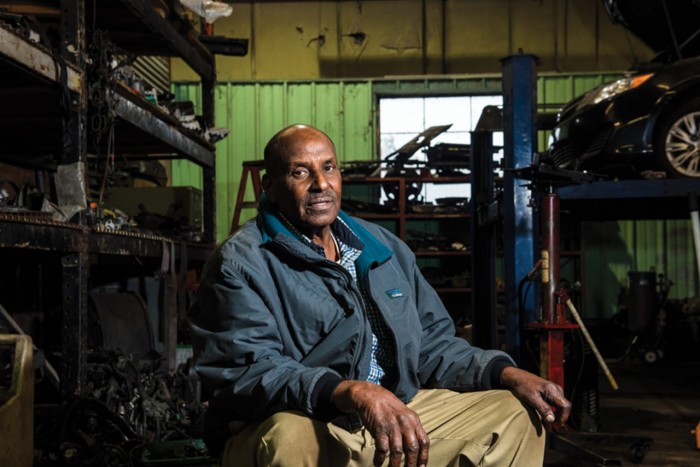On Jan. 14, Mohamed Omar, a 31-year-old Nashville resident who buys and sells used cars for a living, was released after serving almost four years off and on in a federal detention center outside of Bowling Green, Ky. That in itself is not unusual: 11 million people cycle through American jails each year, according to recent reports filed by the Vera Institute of Justice and the Prison Policy Initiative.
What’s different about this case are the circumstances behind Omar’s trial.
He hasn’t had one.
On Nov. 8, 2010, Omar and his two brothers Abdifatah and Liban — both at least part-time Nashville residents, both members of Middle Tennessee’s large Somali community — were taken into federal custody. The arrests stemmed from one of Tennessee’s largest recent criminal investigations: an interstate, interagency effort that coordinated some 30 arrests in Nashville and Minneapolis.
According to the indictment filed by the U.S. Attorney’s Office for the Middle District of Tennessee in November 2010, federal and state agencies uncovered evidence that an organized crime ring was profiting from a cross-country pipeline for stolen cars, credit-card fraud, and black-market credit-card theft machines. Most shockingly, the ring also allegedly moved young Somali women along a sex-trafficking conduit extending from Minnesota through Columbus, Ohio, to Tennessee.
The government’s first indictment, revised three times throughout the course of this case, described three Minneapolis gangs as “operating in conjunction with each other”: the Somali Outlaws, the Somali Mafia and the Lady Outlaws. The alleged members were primarily Somali, many here as refugees. And the government’s formal theory was that the nature of the crime ring made most of those individuals guilty of conspiracy — conspiring to commit sex trafficking of a person under the age of 18, a charge that carries a maximum penalty of life imprisonment.
A senior Nashville district court judge, William J. Haynes, has questioned that theory. The many crimes listed on the indictment involve stolen credit card numbers, machines for swiping stolen credit cards, perjury, and various sex-trafficking-related offenses. Each individual faced, or currently faces, his or her own set of charges. Yet no single defendant is common to all the alleged crimes, or even a majority of them. The crimes have varying degrees of severity, and they occured at different times and in different states and cities. Some defendants, including Abdifatah Omar, have no connection at all to any overt act of sex trafficking. Even so, 24 of the 30 defendants were charged with co-conspiracy in that single venture.
That theory included, in 2010, and still includes, in 2016, the Omar brothers. Mohamed denies all charges against him, and in particular denies membership in any kind of Somali “gang,” conspiracy or venture. His uncle, Hindi Omar, a skilled mechanic who operates a number of auto-repair services that cater to Nashville’s sizable Somali population, has maintained the brothers’ innocence from the first. Ever since the arrests five years ago, he has used his business proceeds to pay for their defense, acting as a father to his nephews.
The case is complex, and whether the Omar brothers are innocent or guilty is for a jury to decide. Therein lies the family’s frustration. Since 2010, for varying periods and at different facilities, Mohamed, Abdifatah and Liban Omar have been detained off and on under the pretext that they pose a threat to the community or a flight risk.
Mohamed was released for one year in early 2013 without any violation of his release conditions; Abdifatah has been released since 2012 without incident. Both were released because Judge Haynes, who initially detained them, found that conditions could be arranged to ensure the safety of the community. The appellate court disagreed with regard to Mohamed, and he was snatched back into custody a year or so later.
As a result, until his release Jan. 14, 2016, Mohamed Omar had spent a total of 47 months in prison. He has yet to be convicted of any crime, let alone tried by a jury. His brother Liban is still incarcerated, totaling 48 months, and Abdifatah remains under supervision.
The extensive operation — a joint effort of the FBI, the Tennessee Bureau of Investigation, the St. Paul, Minn., police department, and the U.S. Immigration and Customs Enforcement agency’s Homeland Security Investigations — was initially met with media approval and credulity, amid growing concerns about interstate sex trafficking. For two years after the initial arrests, in 2010 and 2011, the case made headlines, both nationally (in The New York Times, Huffington Post and USA Today) and locally (in the Nashville City Paper, The Tennessean and other media).
Since then, however, not a single final judgment of conviction for sex trafficking has been entered against any of the 30 individuals charged in this case. (continue reading)
